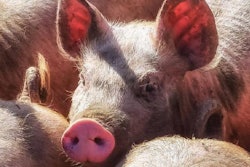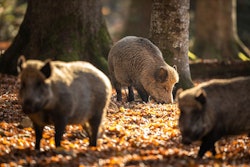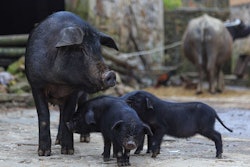
Confirmation of cases of African swine fever (ASF) virus on 2 pig farms in Germany this month has prompted other countries in Europe to step up disease controls.
Over the past two weeks, Europe has seen a new spike in African swine fever (ASF) cases in domestic pigs.
Among the significant developments was confirmation of two outbreaks on farms in Germany at the start of July. Testing positive for the ASF virus were animals at a farm in Lower Saxony (Niedersachsen) — the first cases in this northwestern state of Germany. Within days, an outbreak was confirmed on a fattening pig unit in the east of the country in Brandenburg.
These latest cases brought the total outbreaks in German domestic pigs to seven since September 2020. Included are five outbreaks on farms, and two in small backyard herds.
Germany’s pig industry impacted by ASF spread
Although this is not a high number in relation to the nation’s pig production, these latest developments are affecting the German pork sector.
When ASF was first detected in Germany in 2020, China banned imports of pork from the country previously worth around EUR1 billion (US$1.02 billion). According to Reuters, other trading partners soon took the same action. Other exporters were only too willing to fill the gap, and China’s own pork production is recovering from the country’s own ASF outbreaks.
Furthermore, the recent 300-kilometer jump by the ASF virus to Germany’s most pig-dense state of Lower Saxony ends the prospect of an early resumption of exports to these countries in the near term.
Even as the Lower Saxony outbreak was suspected, investigations began into the source of infection, reported the state’s agriculture ministry. Meanwhile, tracking and tracing of pig movements were carried out. They revealed that one farm that had recently received pigs from the index farm tested negative for the ASF virus. Despite the finding, the 1,800 pigs at the contact farm in Freren were also culled. This decision was taken to reduce the risk of any further transmission of the virus and the suffering of possibly many thousands more pigs.
Throughout the country, pig owners are warning to maintain high levels of biosecurity to protect their herds from the disease.
Other European states respond to German outbreaks
Sudden spread in Germany has caused other European states to step up ASF controls.
As the Lower Saxony outbreak was near to the Dutch border, authorities in The Netherlands raised the level of ASF alert.
Already at the start of July, the French agriculture ministry launched plans to raise awareness and prevent the spread of ASF.
Meanwhile, in the United Kingdom (U.K.), industry body the National Pig Association called on the government to improve border controls to keep the ASF virus out of the country. It urged more robust controls at entry points, including the use of more sniffer dogs. This call came just as a halt to checks on animals and animal products entering the U.K. from the European Union was due to come into effect.
ASF outbreaks in European swine pass 200
So far this year, the number of confirmed ASF outbreaks in domestic pigs in Europe has reached 246.
This is according to the Animal Disease Information System of the European Commission (EC; as of July 3). By that date, 10 European states had officially confirmed one or more ASF outbreaks.
For comparison, 11 European states registered a total of 1,874 ASF outbreaks with the EC over the whole of 2021.
Since the EC’s previous update on June 24, 46 more outbreaks were registered with this system. As well as three in each of Poland and Romania, the total includes 38 new outbreaks in the Republic of Serbia. These were the state’s first outbreaks since February 10, indicating a sudden spike of infections there. At 49, Serbia has recorded the second highest number of outbreaks in domestic pigs in Europe so far this year.
With an outbreak total of 171, Romania accounts for the majority of the region’s ASF cases this year.
Based on information supplied to World Organisation for Animal Health (WOAH), the overwhelming majority of Romania’s ASF outbreaks have affected very small backyard herds with no more than a handful of pigs.
In Poland, seven outbreaks have been confirmed so far this year. Latest to be affected, according to the chief veterinary office, were one herd of 100 pigs and another of 20 animals. Both were located in Lower Silesia (Dolnoslaskie). While this southwestern Polish province borders the Czech Republic, the affected districts are well away from the frontier.
Europe’s wild boar total passes 4,200
So far this year, 4,224 ASF outbreaks among wild boar have occurred in Europe, according to the EC notification system (as of July 3). Registering one or more outbreaks have been 14 of the continent’s states.
Recording the most outbreaks with the EC in 2022 has been Poland (1,266), followed by Germany (960), Hungary (395), Slovakia (365), and Romania (321). Since the previous update on June 26, Italy, Latvia, Lithuania, North Macedonia and Serbia have also notified the EC of new outbreaks.
For comparison, 12 countries registered with the EC one or more ASF cases in wild boar — a total of 12,150 outbreaks — during the whole of 2021.
In Germany, ASF was first detected in September 2020. Since then, 4,065 wild boar have tested positive for the ASF virus (as of July 8), according to the Friedrich-Loeffler Institute.
As of July 1, a total of 202 outbreaks have been confirmed among Italy’s wild boar population. Cases on the mainland have so far been confined to four provinces. Included are two in the northwestern regions of Piedmont (Piemonte) and Liguria, and two near Rome in the Lazio region.
The EC system does not monitor the disease situation in Russia. However, it appears that the ASF re-emerged in Ivanovo oblast in the Central federal district. Following a seven-month hiatus, the virus was detected again in wild boar, according to the latest WOAH notification. Affected was a group of eight animals in early July.
View our continuing coverage of the global African swine fever situation.

















